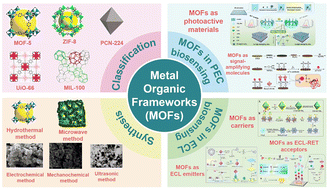Recent advances in metal–organic framework-based photoelectrochemical and electrochemiluminescence biosensors
Abstract
As a newly emerging class of molecular crystal materials, metal–organic frameworks (MOFs) are extensively used in a variety of fields including catalysis, separation, energy storage, and biosensors, by virtue of their large specific surface area, excellent chemical stability, and adjustable pore size. In particular, several functional materials have been integrated into the MOF structure, which greatly improves the conductivity of MOFs and facilitates the application of MOFs in the field of electrochemical biosensing. Herein, this review highlights the recent applications of MOF composites for photoelectrochemical (PEC) and electrochemiluminescence (ECL) biosensors. This paper first briefly describes the classification and various synthesis methods of MOFs. Then, it comprehensively summarizes different types of MOF-based biosensors in PEC and ECL and their applications. Finally, the challenges and outlook for future work in MOF-based PEC and ECL biosensors are tentatively proposed.

- This article is part of the themed collections: Analyst Review Articles 2023 and Analyst HOT Articles 2023


 Please wait while we load your content...
Please wait while we load your content...